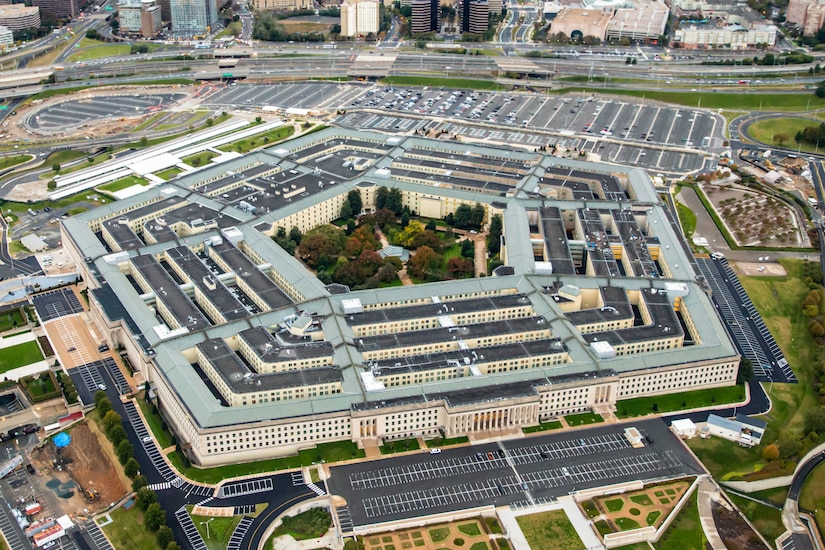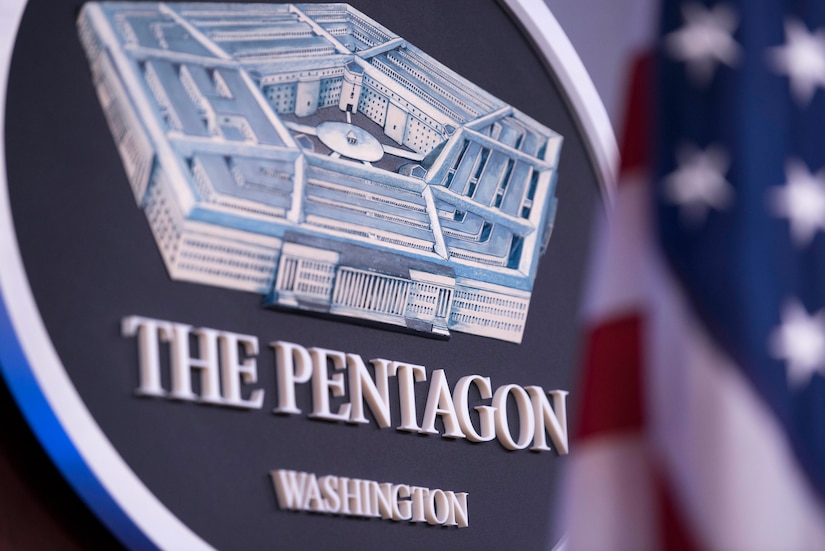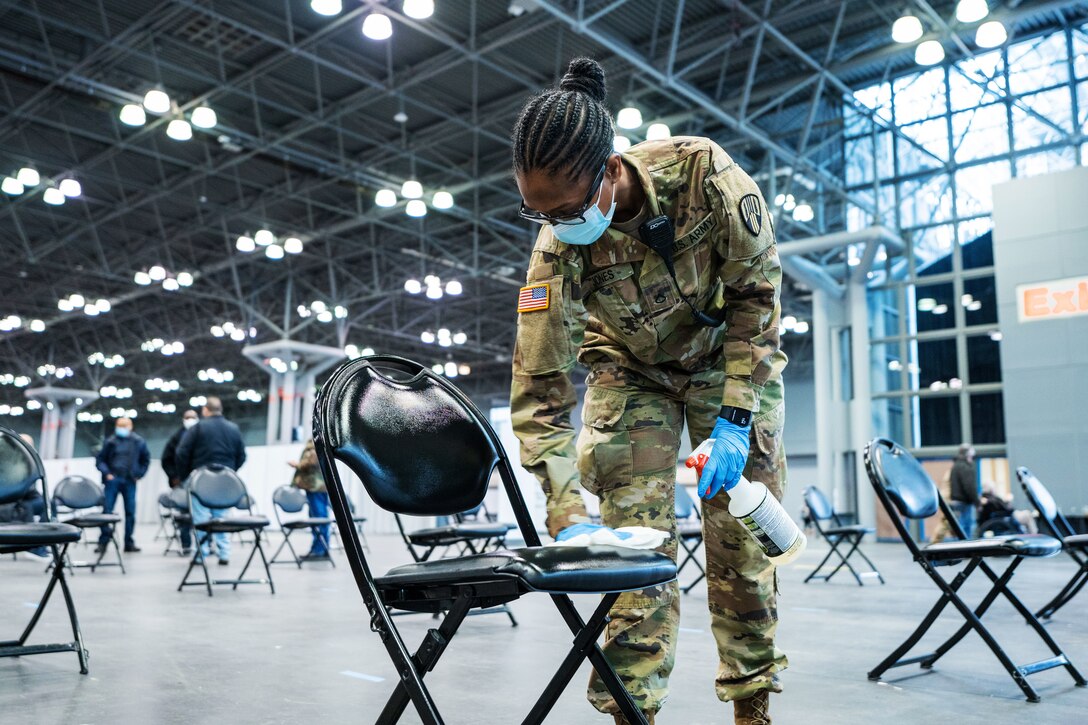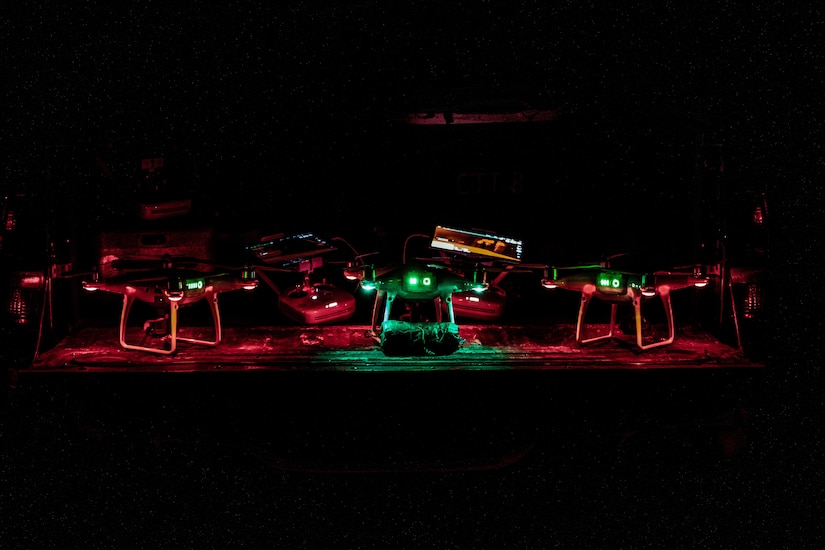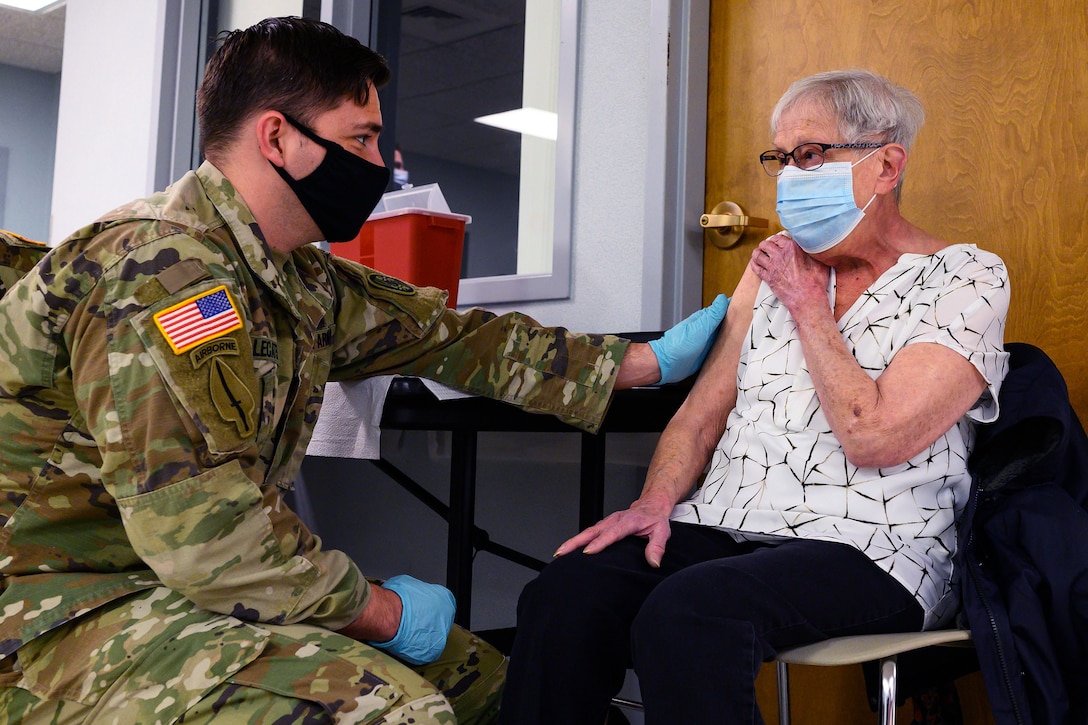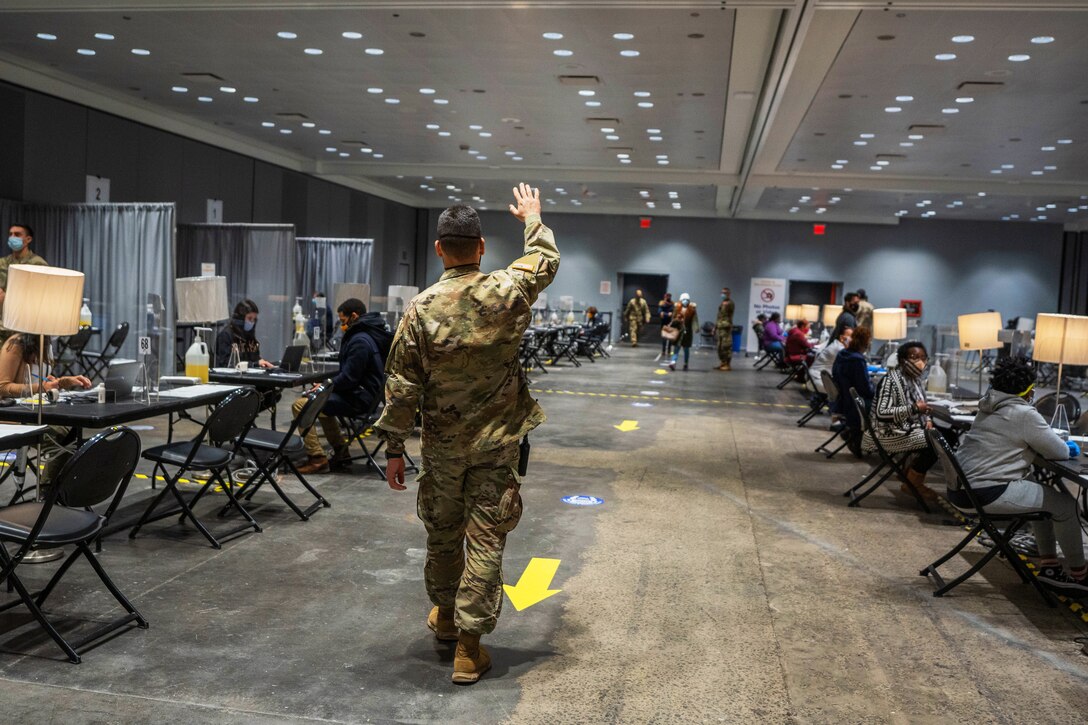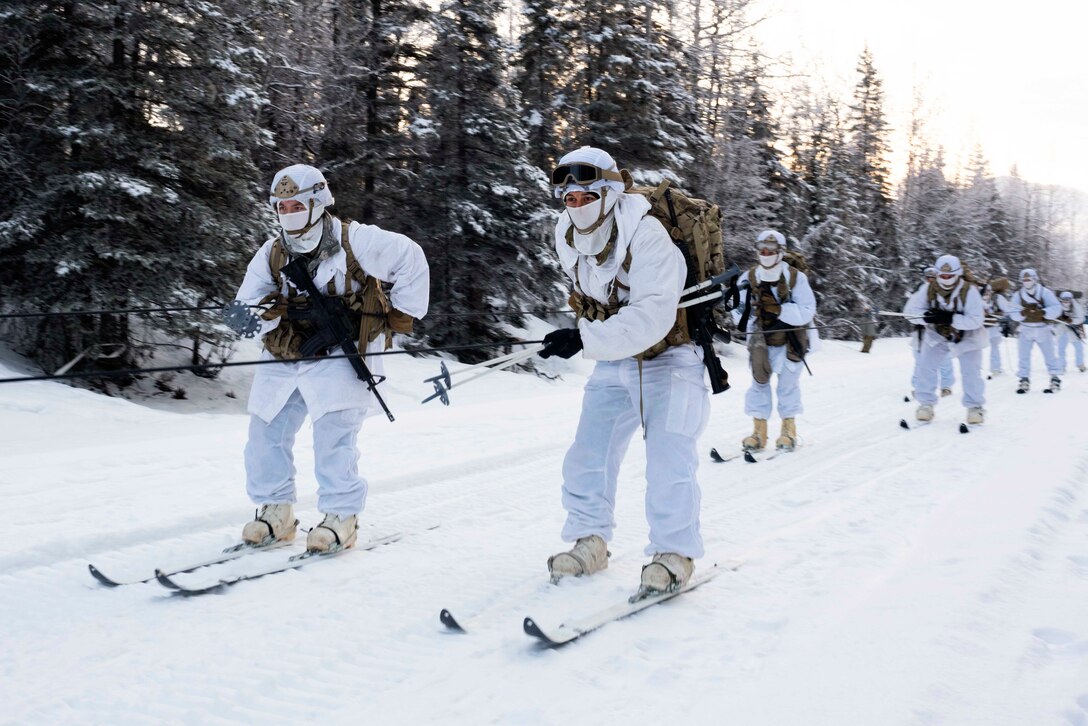Feb. 2, 2021
Pentagon Press Secretary John F. Kirby
PRESS SECRETARY JOHN KIRBY: Okay, just a couple
things off the top here. Just to give you a quick update, I think some
of you have been tracking this.
The USS Nimitz Carrier Strike Group is departing the Central Command
Area of Responsibility, and they'll be now supporting the USINDOPACOM
Area of Responsibility. We want to thank all the men and women aboard
the ships in that strike group, and the squadrons who supported Central
Command now for more than 270 days, ensuring our national security and
deterring conflict in a very critical region of the world.
Yesterday, we also announced -- I think that you saw the department
has awarded two contract actions in support of the coronavirus response
efforts, in coordination with the Department of Health and Human
Services. The department awarded a $231.8 million contract to Ellume USA
LLC for their COVID-19 home tests, as the first over-the-counter,
no-prescription-required in-home test.
It can be performed in approximately 15 minutes from nasal swab
specimen -- from a naval -- naval -- naval, I got Navy on the brain here
-- from a nasal swab specimen, with results reported via a smartphone
app.
This effort will directly support the National Strategy for COVID-19
Response and Pandemic Preparedness policy by including the procurement
of 8.5 million tests to be distributed across the country. The
contractor now is preparing a distribution plan. That's due in 15 days,
and so we'll have a lot more information -- the company will have a lot
more information in a couple of weeks about exactly how they're going to
be distributed.
Additionally under the Defense Production Act Title 3, the department
entered a $1.1 million agreement with American Apparel, Inc. to sustain
critical industrial-based production of U.S. military uniforms. As a
domestic supplier of Berry Amendment Compliant Uniforms, American
Apparel intends to use the funds to purchase and install equipment that
will increase manufacturing automation. This new equipment will increase
production capacity to meet all current contract requirements plus any
surge requirements up to 25 percent.
Now on the personnel front, we've on boarded another 14 employees
yesterday; it's great to have these team members aboard, we look forward
to their contributions to the department. Among the new arrivals were
Mieke Eoyang, the Deputy Assistant Secretary of Defense for Cyber
Policy, and Brent Woolfork, who will be the Deputy Assistant Secretary
of Defense for House Affairs.
Now shifting gears. Over the weekend Secretary Austin directed a
zero-based review of all DOD advisory committees to include those not
otherwise subject to the Federal Advisory Committee Act. The Secretary
was deeply concerned with the pace and the extent of recent changes to
memberships of Department Advisory Committees and this review will allow
him now to quickly get his arms around the purpose of these boards and
to make sure the Advisory Committees are in fact providing the best
possible advice to department leadership. The review looks specifically
for opportunities to find efficiencies across similar board's works and
to balance committee membership, to provide again the best advice to our
leadership here.
The Interim Director of Administration and Management and the Acting
General Counsel of the Department of Defense will lead this review. Each
component head that sponsors a DOD committee will conduct an in depth
business case supported by fact-based evidence for the continued
utilization of each committee. I think you know that these boards are
sort of nested inside sponsors in the building. For instance the Defense
Policy Board that the sponsor of that is the Undersecretary of Defense
for Policy, the Defense Business Board, the sponsor for that is the
Deputy Secretary of Defense.
These sponsors will also consider each committee's mission and
function as it relates to the national defense strategy and through our
own strategic priorities. We'll get potential functional realignments to
create a single cross-functional advisory committee when it's
appropriate and they'll also look at potential legislative changes to
non-discretionary advisory committees to align their missions and
functions to DOD priorities.
Each board's sponsor will submit their completed reviews by April
30th, the end of that month, and in turn those will incorporate or
inform final recommendations that will be made to the Secretary by or of
each committee by June 1st of this year, 2021.
So the recommendations we expect, the Secretary expects will include
retention, realignment, termination, changes to mission or functions,
membership balance, membership size and possible legislative changes
again to the non-discretionary advisory committees.
The Secretary also directed that all members currently serving on DOD
Advisory Committees and subcommittees where he or another DOD civilian
employee or active duty member of the Armed Forces is the approval
authority for members to conclude their service no later than February
16th, this month.
Members appointed by Congress or the president, of course, are
retained during the review period. The review will apply to more than 40
committees that currently advise the department of cross-policy,
personnel, business, science, education, training, healthcare and
memorial activities. And I think if we haven't already we will post
obviously the Secretary's Memo, the directing memo to this, as well as
the associated list of committees that are being reviewed; and with that
I'll take questions. I think Lita we got you on the phone, is that
right?
Q: That is correct. Thank you. So two, one follow-up and another
question. On the Nimitz, can you tell us what the Secretary thinks about
having a carrier in this fleet, in the Gulf? Is he in favor of having
one there in a persistent presence or not? Will another carrier be going
to the, this fleet to replace the Nimitz?
And then second, do you have any update on the FEMA vaccine request?
You don't have to go into all of it but just any update from it?
MR. KIRBY: Right. I don't have an update on -- I’ll take your second
one; I don't have an update on the requests that we have received from
FEMA for administration support and by administration I mean the
administration of vaccines; I don't have an update for that. That is
still being analyzed. Again we're working hard on this, we understand
the sense of urgency and I suspect we'll be able to tell you more in
relatively short fashion but I don't have an update today.
On the Nimitz, obviously the Secretary is concerned about making sure
that the Defense Department and our forces and fleet forces overseas
have the capabilities they need to deter conflict and to respond if
needed. It is as you all know a balancing act between requirements and
the capabilities on hand. The Secretary believes that we have a robust
presence in the Middle East to respond. It's a constant discussion that
he has with the Central Command Commander as well as the Combatant
Commanders in other parts of the world to properly meet those
requirements and to balance the risk and I don't have any announcements
today with respect to carrier presence in that part of the world and you
know obviously if and when we do have something to announce in that
regard we certainly will.
Q: Let me follow up on this.
MR. KIRBY: Go ahead.
Q: So was this decision to remove the Nimitz, was it based on any
assessment of the security situation in the region, especially in the
Gulf area and should Iran read this as somehow, you know, a signal from
the Biden administration of their willingness to engage more in
diplomacy instead of just a show of force?
MR. KIRBY: Well every decision that we make with military forces;
air, ground or Naval and certainly decisions they can make with respect
to a capital asset like an aircraft carrier and its associated
supporting strike group is a decision driven by a frank assessment of
the operational need, the threats in the area and also a frank
consideration of the capabilities themselves and so absolutely the
Secretary was mindful of the larger geostrategic picture when he
approved the movement of the carrier strike group from the Central
Command area of responsibility to the INDOPACOM area of responsibility.
Also and I'd be you know I would be irresponsible if I didn't remind
you that this particular carrier and the strike group have been at sea
for quite some time, a much longer deployment than is typically required
and so there are those considerations to make as well.
Right now the carrier is moving to support the INDOPACOM area of
responsibility and that's the focus right now. I won't get ahead of
future schedules. The other thing I would remind you is, and I think you
guys know this, that your Naval assets are mobile and they're agile and
they're flexible and as you know the Navy likes to say, they don't need
permission slips to operate in certain parts of the world so I think
the Secretary understanding all that is you know remains obviously
focused on the threats in the region and will continue to address it
day-by-day about what the requirements actually are.
Q: John, can we get back to FEMA issue? First of all, exactly what
are they requesting? Is it administering the vaccine? If that's the case
are we looking more at military medical personnel as far as the
support? And also are we looking at hundreds or thousands? Ballpark on
the effort. I know you haven't come up with final figures yet.
MR. KIRBY: That's right, Tom. But I think I can help bound this a
little bit and I'm glad for the opportunity. The request is largely for
assistance with administering vaccines. So these would be people,
professionals that can help actually put shots in arms. So following
that you can imagine there's -- what we're looking at is a blend of
clinical and nonclinical personnel to do that. And I'm reticent to get
into specific numbers because we're still working our way through this.
Now as for total numbers and again I'm reluctant to put something on
the wall here because the analysis is still going on, but I would you
know I think it's safe to assume that we'd be talking in the thousands
eventually. But how high and where I just don't know yet. And I you know
I beg your forgiveness; we're working on this now and I think we'll be
able to have more detail for you soon but we're just not there.
And the other thing I'd want to say if you don't mind while I
(LAUGHS) filibuster here is it's important to remember that this is the
DOD support to FEMA and to governors and to civil officials around the
country; this is not, we are very much a supporting element here and not
trying to drive the actual system itself.
Q : Presumably we're looking at active and reserve because the governors can get the Guard from their own state. Right?
MR. KIRBY: You know again I don't want to be too specific about
sourcing but as I said last week, I think it's certainly as we look at
capabilities we're looking across the joint force, which would include
Reserves as well; whether that ends up being part of the sourcing
solution I don't know yet but it would be irresponsible for us not to
look at the whole joint force. Does that make sense?
Q: Yeah.
MR. KIRBY: Jen?
Q: Thank you very much, John. I'm your (inaudible).
MR. KIRBY: You do whatever you need to do.
Q: Thank you very much. How will the United States get involved with
Burma’s military coup? Do you know (inaudible) right now? So how would
you --?
(CROSSTALK)
MR. KIRBY: Oh, in Burma. How is the military going to get involved? I
don't believe we foresee right now with what's going on there, a U.S.
military solution or action required; we certainly have viewed with
great alarm what has happened in Burma, but I don't see any U.S.
military role right now. Jen?
Q: One more quick, has there ever been any sign or movement in a military coup in the United States, over the past few months.
MR. KIRBY: Can you -- can I ask you to do that one again?
Q: Is there any sign or movement of military coup d’état in United States over the past few months?
MR. KIRBY: Have I -- have we seen a --
Q: Yes, in the United States.
MR. KIRBY: -- the movement of a military coup in the United States?
Q: Yes, because of the last Trump administration is --
(CROSSTALK)
MR. KIRBY: No. I -- I -- no. The United States military is one of the
most trusted institutions in this country, and I think you were all
here and watched Chairman Milley and the Joint Chiefs, how they
performed and how they made it very clear that there wasn't going to be a
political role for the U.S. military. I -- I -- no.
Jen?
Q: Is the secretary comfortable with the number of National Guard
troops that are up at the Capitol right now? Is it overstaffed, given
the threat levels? Are there any concrete threats that have been
presented?
And what happened to the 12 National Guard who were sent home because
they were flagged by either FBI or Secret Service prior to the
inauguration? Are they being prosecuted in some way? Is it a chain of
command issue? What happened with those 12 and what were there -- have
the investigations found that they either committed any violation or
broke any laws?
MR. KIRBY: So on your -- let me go second first. I would refer you to
the National Guard, Jen. That's not information that -- that we would
necessarily have here, that the National Guard, in this case the units
would be -- excuse me -- I think better served to address that.
As for the mission itself, we have a little bit more than 7,000 right
now. As you know, not all 7,000 are out at any given time, they work in
shifts. The secretary had the opportunity on Friday evening to go spend
some time with them. He was very impressed with -- with the work
they're doing, thanked them for that, promised them his support.
I won't get into -- and I wouldn't -- get into specific threat
analysis here from the podium, but I would tell you that the department
still considers this a valid requirement based on the requests for
additional support, continued support, I should say, that we've gotten
from federal and local authorities including the Secret Service.
And that it's a -- that we're -- every day, we're reviewing the
status of the mission. So right now we have more than 7,000. I don't
want to get too predictive about what it's going to look like, forward. I
think -- but to go back to what -- you know, the secretary, he -- as he
told the National Guardsmen Friday, I mean, he very much wants to get
them back home and back to their lives and to their jobs and to their
families as soon as possible.
But we also have what we still consider to be a valid requirement for
their assistance, and we're going to have to, you know, continue to
meet that. And I wouldn't get more predictive -- you know, more than
that right now, more specific.
Let's see, we'll go to David Martin. You are on the phone, is that right?
Q: I am. I think you said in the statement on advisory committees
that the secretary was concerned about the pace of change. Can you tell
us that this -- this review was a specific reaction to all of the
dismissals and appointments in the final days of the Trump
administration?
MR. KIRBY: There's no question, David, that the -- the frenetic
activity that occurred to the composition of so many boards in just the
-- in just the period of November to January, deeply concerned the
secretary and certainly helped drive him to this decision, yes.
Let's see, maybe we can do another one on the phone, I have to keep remembering to do this. Tony, Tony Capaccio?
(CROSSTALK)
Q: Hi -- hi, John. I have a quick question closer to home. On
recusals, the issue came up today, the deputy secretary Hicks'
nomination hearing by the Senate Armed Services Committee. Has the
secretary laid out programs he will definitely recuse himself from that
are Raytheon related?
F-35, Ground Based Strategic Deterrents, and the Long Range Stand Off
Weapon. Those last two came up today in the written questions from the
Senate to Ms. Hicks.
MR. KIRBY: So thank you, Tony. As I think you saw, the -- the
secretary commit to, that he will recuse himself from Raytheon-related
decisions, not unlike, in fact, the -- the same way that the previous
secretary, Secretary Esper, did. And as a matter of fact, he intends to
use the same sort of decision-making, vetting process for Raytheon
decisions that Secretary Esper had in place.
Q: That was that screening process he set up so staff would be able
to winnow through programs that may or may not be Raytheon-related?
MR. KIRBY: That's correct, Tony, same screening process. He's
committed to doing that, he's made that direction to the staff so that
he can be absolutely, 100 percent committed to abiding by his agreement
to recuse.
Yeah.
Q: May I ask you, is the F-35, though, the Pentagon's largest
program, Raytheon makes the engines for it. Will he specifically recuse
himself from decisions on that program?
MR. KIRBY: You know, Tony, let me take the question and get back on
the -- the aegis here. I -- but before I do that, just re-enforce that
he takes very seriously his recusal responsibilities from
Raytheon-related programs and systems. And so I can assure you that
he'll do that. What you're asking is a broader question, and I owe you a
better answer on that.
Go ahead.
Q: Thank you.
Q: I have actually one follow-up on Nimitz, and two on Syria.
So on Nimitz, does the -- does it have anything to do with the rising
tension between China and India that you deployed -- deployed the ship
to INDOPACOM?
MR. KIRBY: I'm not going to get into specific rationale for why a
ship is moved, you know, from one area of responsibility to another. We
certainly have legitimate requirements for naval power in both areas of
responsibility. And there is a finite number of aircraft carriers
available at any given time. So this is a constant balancing act that
the leadership here, the secretary has to perform in terms of meeting
requirements with capabilities.
I would be -- it -- I would not characterize this as a response to a
specific issue or event or public comment by a leader here or there, it
is very typical for us to move naval assets from one area of
responsibility to another to meet a plethora of different missions.
Sometimes it's just training, sometimes it's transit from one place to
another.
In this place, the Nimitz is at the end of a very, very long
deployment. So I wouldn't read too much into that. But -- but that's the
justification.
And you had another question?
Q: Yeah, on Syria, that there have been several terrorist attacks in
northwest Syria, on civilians. And State Department yesterday, of
course, condemned those attacks. But Turkey has been accusing YPG for
those attacks. And YPG's the leading force of SDF, which is supported by
the United States.
So, would you rule out that YPG is somehow behind those attacks?
MR. KIRBY: I am not familiar with the -- I'm not familiar with the
operational assessments on this and I'd refer you to the State
Department, that is -- that's not really something that would be in our
privy at the U.S. Military to talk about.
We'll go back here and then -- and then I'll go to another one on the phone, go ahead.
Q: Okay. Thank you very much. I wanted to ask you about the
negotiations for a new coastal sharing agreement for hosting the U.S.
Troops in Japan and South Korea. The previous administration said the
coastal sharing agreement was not fair to the U.S. and they said that
the ASEAN allies should assume greater share of the burden. What do you
figure a function on this issue? Do you think that ASEAN allies should
spend more for U.S. troops? Thank you.
MR. KIRBY: I -- I don't -- right now we're I think looking at, as I
said last week, sort of a global posture review. We're in the midst of
taking a look at our force posture around the world and the
contributions that we're making.
So, I'm not prepared to give you a specific answer to that right now.
The secretary certainly looks forward to discussing with our partners
in the Pacific, ASEAN members as well, you know that it's -- that that's
an important part of the world for us. But I'm not -- I don't have
anything to read out specifically today in terms of you know dollar
figures in terms of cost sharing.
The only thing I would say writ large is that the secretary remains
committed to re-invigorating our alliances and our partnerships around
the world and our friendships because he -- as he said on day one,
nobody can do this alone, we all need partners and friends, and you know
five of our seven treaty alliances are in the Pacific, I'm not assuming
-- I'm not suggesting ASEAN is one of those, it's not -- but my point
I'm trying to make is that is that we have many partners and allies in
that region, it's a critical part of the world.
You heard the secretary talk about the focus that we need to the
stronger focus we need to apply to the Asia Pacific region and I think
you'll see him over time continue to bear that out with decisions and
policies that we're putting in place.
Q: Thank you.
MR. KIRBY: Let me go -- let me go to the phone -- let me go to the phone. Carol Rosenberg?
Q: Thank you, Admiral. Can you see whether all the 15,000 troops at
JTF-GTMO who wanted the vaccine got a vaccine? All the prison staff who
wanted to be protected, already protected? It looks like they're now
offering them to schoolteachers, bartenders, and commissary workers down
there.
MR. KIRBY: I can't answer the first question, Carol, I don't know and
I certainly refer you down to either to the Navy or to Southern Command
just to speak specific numbers. I do know that they had begun the
vaccination of men and women who work down at Guantanamo Bay on the base
and with the JTF and they were moving along the previous departmental
vaccination schema in terms of priorities.
So, they -- there are certainly members of the military that have
been vaccinated and again I'd remind you that it's a voluntary vaccine,
you -- we cannot compel it. But I know that there were -- there were
members of the military that had been vaccinated down there.
The exact numbers, Carol, I'm just not -- I don't have in front of me
right now but I'll tell you what, we'll take that question but we'll
also make sure that it gets properly staffed through the Navy and
through Southern Command.
Yes, Dan.
Q: Can we just go back to the Nimitz just to be clear, was there a
reduction in the threat level and that was part of the rationale for
that decision or is that not the case?
MR. KIRBY: The Nimitz?
Q: Yes.
MR. KIRBY: Again, Dan, I'm really reluctant to get into specific
discussions of threats and intelligence. We don't make decisions like
this lightly and there's a lot of factors, particularly when you're
dealing with a strike group that has been at sea and deployed for as
long as -- as it has been.
I mean, ten months or it's about to be ten months, and so you have to
consider the wear and tear on the ship itself, as well as the effect on
sailors who are incredibly resilient.
So, there's a lot of factors that go into this and again I would -- I
think it would be imprudent for us to look at this and think, well this
is based on a specific piece of intel, on a specific part of the world,
it's about balancing capabilities against the requirements and there
are requirements for Naval assets in many places of the world.
And then there's a limited number of aircraft carriers. What -- but I
want to pull back, again, to make a larger point that we haven't a lot
of military capacity in the Central command AOR, that area of
responsibility.
And we are constantly working with Combatant Commanders and in this
case, General McKenzie, to do the best we can to meet their requirements
for additional forces for as long as possible, you know, against the
requirement.
And I just don't want to get ahead of the secretary's decision space
with respect to future Naval assets that may or may not operate in that
part of the world. We're constantly watching the threat; we're
constantly trying to meet that threat with proper capabilities.
The secretary's very comfortable that that process of evaluation is
ongoing and he is connected to the Combatant Commanders, these two in
particular, and this decision was made in consultation with them and
with the -- the Navy. So, I --
Q: (inaudible) --
(CROSSTALK)
MR. KIRBY: Let me -- let me, sir --sir, hang on a second, let me get Dan and I've already gotten you so just give me --
Q: I was wondering --
MR. KIRBY: Hang on just a second, sir.
Q: In the CENTCOM AOR in Afghanistan you've talked about troops
levels and the considerations last week, what -- is the secretary ruling
out the possibility of any minor additional forces because of the
situation there either for force protection reasons or other requests
from the Afghan government?
MR. KIRBY: The secretary's not ruling anything in or out, Dan, I mean
he's mindful of the need and he's mindful of the threat and we're
constantly evaluating that, almost on a daily basis. There are a lot of
resources in the region, there are other resources that can be mobilized
if needed. But I just don't think we're you know -- I wouldn't want to
get into the specifics of how that's -- of how that's being done.
Again, I want to go back to he's -- he's made this -- this decision
to allow this transfer into a -- into a different area of responsibility
in consultation with both Combatant Commanders and with the Navy and
frankly with the chairman of the joint chiefs as well, and his belief is
that this move is in the national interest and he's always going to
fall back on that as he makes these decisions. And again, I just
wouldn't want to close down his decision space in the -- in the future.
Q: And on Afghanistan, he would not rule out the idea of considering
at least the idea of enlarging the U.S. footprint there to some degree?
MR. KIRBY: Again -- again I don't want to get into hypotheticals as I
said last week, any future -- there's no -- I don't have any future
force posture decisions to read out or to announce. Future decisions
about force posture in Afghanistan are going to be conditions-based.
Q: Abraham Mahshie, Washington Examiner. I wonder if I could go back to the Guard force posture in the Capitol --
MR. KIRBY: Sure.
Q: -- and your cooperation with FBI in support.
MR. KIRBY: Sure.
Q: Can you say whether or not the FBI has sent you more alerts which
come when there is an arrest of service-members or there is information
about service-members, active duty or veterans related to the Capitol
riots January 6th? And also the acting army secretary spoke to us
recently and did give us -- characterize a little bit of what the threat
assessment is in the Capitol. I wonder if you could provide us an
answer: Is there even a threat anymore? When you say you're going to
review it on a daily basis, could you downgrade the Guard presence in
the Capitol, is that possible?
MR. KIRBY: Again, reticent to get into hypotheticals. So let me just
try to parse this out here. I would refer you to the services for any
notifications that might come from civilian law enforcement to include
the FBI, because that wouldn't come in to the office of the secretary,
that would go to the services. And I'm not aware of any additional
notifications by the FBI for additional investigative work on other
members. I'm just simply not aware of that and I would point you to the
services for that.
As I said in my answer earlier, we're constantly reviewing the force
posture here, the presence of the Guard in the Capitol Region. We
understand that they left jobs and homes and families, and they want to
get back to them. But from the secretary's visit, it was pretty clear to
him that they also -- they believe in what they're doing. And they
believe it's a valuable mission.
For as long as it is a valuable mission, for as long as it is
required, this request from civil and law enforcement authorities, the
Department of Defense will continue to source it and to meet it. And
when that ends, I don't know. How and at what pace it tapers off, I
don't know, because we're constantly looking at this.
But to go back to what I told you earlier, the secretary made it
clear to those soldiers that he doesn't want to keep them out there any
longer than they need to be, because he knows, you know, they're making
an enormous sacrifice, and so are their families. And it's cold outside.
And that is not fun work. And he recognizes that as a former soldier
himself. So we're going to just keep -- every day, you know, we'll keep
looking at this.
And on the threat assessment, I'm just reticent to get into that.
That's just not -- that's not a healthy thing for me to do at the
podium, is to talk about specific threats and intelligence.
Let me go back to the phone for a second. Let's see. Paul McLeary, Breaking Defense?
Q: Hi, John, thanks. I wanted to ask a kind of in-house question
about the executive order from President Biden last week about the
climate crisis. Who is leading the charge at DoD to kind of marshal all
the -- you know, get everyone together and submit that report to the
White House? And what kind of effect do you think this new order is
going to have on acquisition and operations, things like that, going
forward?
MR. KIRBY: I missed the question. It was -- I missed the first part of your question, Paul. It was a directive about what?
Q: Climate crisis.
Q: Yes, climate change, executive order.
MR. KIRBY: Oh, climate change. Okay. I'm sorry.
(CROSSTALK)
MR. KIRBY: Yes, I know. I didn't get that.
So, taking a couple of steps back, I mean, the secretary has made it
clear, you saw his statement. He believes climate change is a national
security issue. It affects our facilities and our infrastructure. It
affects things like, you know, Navy ship piers and our bases around the
world as a result of the extreme weather that climate change contributes
to.
It also is a driver of people. It's a driver of refugees, which also
contributes to instability and insecurity in places where oftentimes the
military -- U.S. military then has to deploy to support allies and
partners around the world. And, of course, it requires many times the
use of the military for humanitarian assistance and disaster relief, you
know, driven by severe weather, which is, of course, scientists have
shown is -- lately has been driven by the changing climate.
I don't have specifics, Paul, for you in terms of how that breaks out
into, you know, dollar figures right now. I mean, previous estimates
have been in the many millions of dollars in terms of the effect it has
on the U.S. military. As you saw in the president's executive order, he
wants and tasks the secretary to factor in climate change into not only
resourcing allocations, but operational concepts, even war-gaming.
And so the secretary has made that very clear to the department that
he takes that tasking very seriously and will do the spade work to do
that by the deadline, which I think was 60 days, what the E.O. said.
So we'll have, I think, more specifics to put on that, Paul, once we
get further down fleshing out what we've been tasked to do. But, you
know, again, it's a national security issue. He takes it that seriously.
He knows it has a dramatic and specific effect on the U.S. military and
our capabilities around the world.
Yes, Meghann.
Q: Another Fifth Fleet question. So Nimitz has made its way out.
Eisenhower is basically next in line for deployment. And it would be
also less than a year, it would only be a few months, since they came
back from their last deployment. Has the secretary, in considering these
requests from CENTCOM to have a persistent carrier presence in
(inaudible), has he considered the wear and tear on the ships, the wear
and tear on the crews doing so many back-to-back deployments or these
extremely long deployments the way Nimitz has?
Is it possible that you could let some time lapse in Fifth Fleet
without a carrier to shore up the readiness and the morale of some of
these crews?
MR. KIRBY: Well, without getting into the specific decisions based on
force presence in Central Command, the short answer to your question,
Meghann, is, yes, the secretary obviously factors in the wear and tear
on the fleet and on the ships and the sailors just as he would the
resilience and the wear and tear on military units of all different
stripes. It's absolutely part of his calculus.
And that's why before he makes a decision like the one that he just
made, he consults with the service, in this case, the Navy, and with the
combatant commanders that are affected by this decision. And it is --
in many cases, it's a balancing act. You have X number of requirements.
You have Y number of capabilities. And you want to try to meet those
requirements as best you can.
And you're no stranger to the building. You're no stranger to this
issue. There are some times where you can't meet all requirements every
day, and you've got to balance what you can apply to those requirements.
And that is the -- that's the business of national security
decision-making that the secretary is in. And I -- you know, we saw that
process play out here with this particular decision.
I'll take Lucas, and then I'll go to the phone. Go ahead.
Q: Question on nuclear weapons. The head of U.S. Strategic Command
recently said in an issue of Proceedings, quote, "There is a real
possibility that a regional crisis with Russia or China could escalate
quickly to a conflict involving nuclear weapons." Admiral Charles
Richard went on to say, the U.S. military must shift its principal
assumption from nuclear employment is not possible to nuclear employment
is a very real possibility.
Does the secretary agree with that statement?
MR. KIRBY: The secretary, as I think you've heard him say, certainly
considers our nuclear capabilities and their modernization a key
priority. He's also said that the -- we don't want things to escalate to
conflicts, certainly not of that scale. And so his job, he believes, is
to protect and defend the American people. And that means having a
broad mix of capabilities that -- that are ready to do that. And that
includes nuclear strategic capabilities.
And he's committed to, as I think you've heard him say, conducting a
Nuclear Posture Review, to better understand the state of modernization
and the need for innovation and research and development of -- you know,
of improving those capabilities over time. So I think he certainly
shares the admiral's concern that -- that these capabilities are
important.
And that -- and you've heard him talk about both Russia and China.
China being the pacing challenge of this Department and Russia clearly
posing a threat on many fronts, and he takes those -- he takes those
seriously.
And as he -- as he works through the posture review of nuclear
capabilities and as he works through the Global Posture Review, I think
you'll see those things sort of integrate and come -- and come into
focus about what kinds of long-term posture and capabilities we're going
to try to put in the field to make sure, again, that we can defend the
American people.
Q: Are tensions among nuclear-armed nations the highest they've ever been since the Cuban Missile Crisis?
MR. KIRBY: You know, I try to stay away from superlatives, Lucas. I
mean, again, he views China as the biggest pacing challenge for this
Department. Nobody wants to see things end up in conflict, certainly not
on that scale. But it's his job and it's the Department's job to help
deter -- to prevent that kind of conflict, particularly on that scale.
And I would just say that -- you know, that's where his head is, rather
than getting into, you know, the specifics of most this or most
dangerous that.
Clearly there is much work to do and you've heard Secretary of State
Blinken mention this just the other day, there's much work to do with
our bilateral relations with China and with Russia. But our job here at
the Defense Department is to make sure that we can protect the American
people from threats.
I'm going to -- let me go to the phone. Let me go to the phone. Lara Seligman?
Q: Hi, I have a question actually about Guantanamo Bay. Can you tell
me please, who made the decision to begin vaccinating the prisoners? Was
that something that was in the works in the previous administration or
was that something that the Biden administration initiated? And can you
tell me why?
MR. KIRBY: Why what, Lara?
Q: Why was that decision initially made? What was the reasoning?
MR. KIRBY: So I think as I referred to earlier, the -- there -- and
you guys know this better than me because you've been here longer than
me -- that the Department had a vaccination plan, a schema if you will,
for phasing in the vaccination of American men and women who support the
military, their workforce -- different phases. The goal being, of
course, to vaccinate those that needed it the earliest and the fastest
-- you know, health care workers and the supporting staff to them, for
instance, were -- you know right at the top of the list.
And because it's a vast bureaucracy, you know, millions of people --
literally hundreds of commands around the world, they -- some areas --
some commands moved through those phases at a faster clip than others.
But these phases were put into place and developed in the previous
administration. Again, the focus was clearly on trying to get the
vaccines to the people that needed it the most.
And so, the -- to your specific question, the vaccination plan
underway was underway before President Biden took office, before
Secretary Austin took office. That's not an -- that's not to impugn that
decision-making process at all but just to answer your question that
that was -- that scheme was already underway and being executed.
Q: (OFF-MIKE) Just a follow-up on Guantanamo --
MR. KIRBY: Yes, Dan.
Q: -- Wouldn't it be for the sake of the health of the U.S. personnel
there, wouldn't it make sense to vaccinate the inmates -- the
detainees?
MR. KIRBY: The health protection of our forces remains a top priority, Dan.
And I think one of the things -- the main reason why we've got a
temporary pause here -- down there is to just better understand how they
move through their scheme, how they move through their phases, and just
to take a look to make sure that -- that we better understand that
process. Again, as I mentioned over the weekend in keeping with our
desire to make sure that -- that the -- the health and well-being of our
troops and their families really are foremost in mind.
I think I've got time for one -- one more. Sir, I'll get you -- you in the back. Go ahead.
Q: (inaudible) Tanabe from Nippon Television, very nice to meet you. And --
MR. KIRBY: Nice to meet you.
Q: -- I'd like to ask you about the Free and Open Indo-Pacific
initiative. And President Biden and Prime Minister Suga the other day
agreed on the importance of the -- this initiative in the last phone
call.
MR. KIRBY: Yes.
Q: So I'd like to ask you, how does the DOD recognize the importance
of this and how do you plan to develop this, especially in order to
counter China?
MR. KIRBY: Well, we don't have time for me to answer that. There's a
lot there. Except, let me just again reiterate the secretary's focus on
the Asia-Pacific region and the many opportunities that are there, not
just challenges. Again, we have the bulk of our treaty alliances are
there. We've got serious security commitments in the Indo-Pacific region
that we intend to meet and to take seriously.
And I think you'll see, as the secretary gets situated and begins to
flesh out what will be the first budget that he under this presidential
administration submits here in the coming months, and as he begins to
evaluate the National Defense Strategy and, as he said in testimony,
begin to flesh out what changes there might be, I think you'll see this
theme come back again and again, this -- this understanding by the
department that that area of the world is vital and we'll -- and must
remain vital. We're a Pacific power, and we have responsibilities
there.
I think you also heard him say, though, just so there's no question,
that in the -- in the main muscle movements of the existing National
Defense Strategy, with respect to great power competition and in
particular the challenge that China poses, that he agrees with that,
okay?
I'll take -- take a couple more here. Ellie Kaufman, CNN? No, you
don't have a question? Or do you? I have to remember to look over here
where it says, "Question, yes or no?" And that one was a no.
Tara Copp?
Okay, we lost Tara. I'll take one more from in the room. Ma'am, you haven't had a question.
Q: Yes, I have two questions on Iraq actually.
MR. KIRBY: On what?
Q: Iraq.
MR. KIRBY: Iraq, okay.
Q: The first one, if you can give us some details on that operation
that killed Abu Yasser al-Issawi last week. Was it like a joint
operation between the international coalition and the Iraqi Forces?
MR. KIRBY: So as I understand it, from Operation Inherent Resolve, it
was a partnered mission. I am -- I'm not going to get into the specific
tactics of what that looks like, I'd refer you to them, that really
wouldn't be appropriate for me to speak to from the podium, but it was a
partnered mission.
Q: And the second question is, is the review, the strategy review
that the Pentagon is conducting in Iraq, would consider the troops'
level there? Are we going to see a significant change of the number of
troops that you have had in Iraq now?
MR. KIRBY: I think the current level in Iraq is around 2,500. I have
no changes to that to report out to you today, no decisions about force
posture there have been made one way or the other.
The secretary wants to get a chance to examine the mission and the
strategy there and make sure that -- that we are executing the right
strategy, a good strategy, and that we are properly resourcing that
strategy. But he is not in a position now where he can make any specific
decisions one way or another, so I don't have any changes to force
posture to read out to you.
Q: Afghanistan, one question?
MR. KIRBY: One more.
Q: Thank you very much. So in response to your statements last week
here, Taliban basically vow to fight U.S. troops if they remain in
Afghanistan beyond next May. So the first question, do you think the
U.S. has enough troops in Afghanistan to deal with such a situation?
And are you willing -- I mean, are you taking that risk assessment
into your consideration in this review of Afghanistan, regardless of
whether Taliban is basically living up to their commitments or not?
MR. KIRBY: Look, I mean, the -- we are committed to a political
settlement in Afghanistan, one that includes the Afghan government. As
we've said many times, an Afghan-led, Afghan-owned peace process. And we
-- we're going to continue to support the achievement of a political
settlement. No force posture decisions have been made, and I wouldn't
speculate beyond that.
We have long believed that political resolution is the best way
forward, and the secretary and the department are committed to that.
MR. KIRBY: Okay, thanks, everybody, appreciate it, thank you very much.
